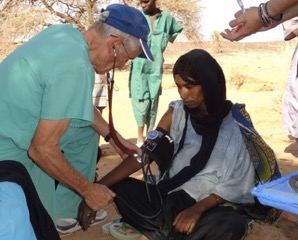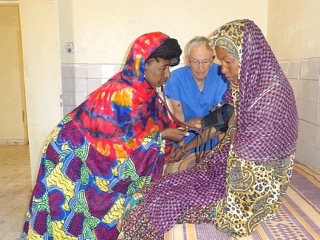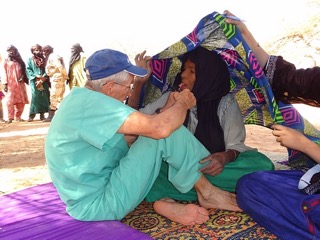Service to Women and Children Featuring Dr. Rob Skankey
This article was first published in the District Newsletter.



Ojai Rotarian Dr. Bob Skankey is happiest when he is using his years of training and experience as an obstetrician and gynecologist to improve the health of women – and the more remote and underserved the location is, the happier he is to work there.
After 28 years of delivering over 3000 babies in the Ojai Valley, Dr. Bob closed his practice in 1997 and expanded his horizons to teach health care workers and care for women in Bolivia, Tonga, Brazil, Nicaragua, Mali, Honduras, and Niger. He trained in Addis Abba, Ethiopia, to learn more about surgical repair of vaginal fistulas.
As a member of Rotary Club of Ojai’s active International Service Committee, Dr. Bob offered boots-on-the-ground expertise in maternal and infant health projects, as well as encouragement for other people’s projects. Dr. Bob’s favorite projects were when he found innovative ways to adapt medical knowledge and technology to meet local needs in a sustainable way.
For 10 years Dr. Bob joined Rtn. Dr. Carl Gross on Rotary medical missions to Roatan, Honduras, to provide care to indigent patients at Glenda Faye Humanitarian Clinic. While Carl steadfastly provides much-needed treatment for diabetes and high blood pressure, Bob addressed gynecological problems. Cervical cancer is a major cause of mortality worldwide among low-income women who don’t have access to early detection through Pap tests. Dr. Bob learned that cryosurgery was used in several African and South American countries to destroy suspicious lesions, bypassing getting a specific diagnosis with Pap smears and biopsies. He researched this technique, and through a district grant the Rotary Clubs of Ojai and Ventura purchased the necessary equipment for the clinic. In 2012 Dr. Skankey arranged for the equipment to be shipped to Roatan, set up the unit, and introduced treatment with it during the next medical mission. He trained the local clinic doctor in how to use it and established a protocol for ongoing use, thus insuring that the equipment would be used when American doctors are not there.
Dr. Bob’s most challenging and personally gratifying project was training 15 Wodaabe and Tuareg women selected by their nomadic communities in Niger, West Africa, to become matrones (midwives trained to manage pregnancies and deliveries with minimal equipment), who could then care for the pregnant women in their remote communities.
This project grew out of twice yearly medical missions to The Nomad Foundation’s Tamesna Center for Nomadic Life, founded by Leslie Clark to provide education, medical services, and a meeting place for nomads in the remote northern regions of Niger edging the Sahara Desert. In 2008 Dr. Bob started to set up the clinic, saw hundreds of patients per mission, and trained a local nurse to run the clinic. Once local staff could provide ongoing medical care to nomads, in 2011 Dr. Bob attacked the extremely high maternal and infant mortality rate among nomadic women.
In Niger one in seven women have a lifetime risk of death in childbirth, with nomadic women having even less access to healthcare than women in other parts of Niger. Dr. Bob initially trained 5 women in communities within traveling distance of the clinic, emphasizing improved prenatal care and better management of labor. Their training included providing medications to treat infections and postpartum hemorrhage, however they found that better prenatal nutrition, hydration, plus hygiene and sanitary practices prenatally and at birth drastically reduced the need for these imported medications.
During prenatal visits, matrones teach pregnant women about the importance of increased hydration, better nutrition, and improved hygiene practices during labor and delivery. All these practices have been accomplished with maximum local sustainability and minimal cost. From 2011-2015 there were no mortalities in the 400+ mothers the matrones attended, and no loss of babies who were born alive. Dr. Skankey was extremely impressed with the skill and competence of the matrones he trained, and the remarkable statistics resulting from their care.
In 2015 Dr. Bob found a way to extend this life-saving training to women living in even more geographically remote areas of Niger. Health care workers from 10 remote nomadic communities were trained by four especially competent matrones, under Dr. Bob's supervision. They were taught proper prenatal care, hydration, hygiene, and nutrition, using locally grown products (moringa tree leaves and dried onions, both portable for use by nomads) instead of supplying imported prenatal vitamins. The training included more effective labor and delivery techniques including complications at birth, but didn’t include use of hard-to-replace imported medications. Dr. Bob authorized the Nomad Foundation nurse to direct the program locally and do follow up missions as necessary. Now the local nurse and midwives can train others, with only occasional refreshers from outside physicians.
Dr. Bob’s last visit to Niger was in 2015, but he is still consulting with the OB/GYN physician who volunteers through The Nomad Foundation to continue his valuable work. At 86, in addition to being patriarch of his enormous family, he is a Cub Scout leader, active in his church, on Rotary Club of Ojai’s International Service Committee, and volunteers for any Rotary Youth Services project that needs him. Dr. Bob’s keen interest in people’s projects, his encouragement, and genuine validation of others make him a favorite tablemate at club meetings. In 2012 Dr. Bob Skankey was one of 100 Rotarians worldwide to be awarded the “Service Above Self” Award, Rotary International’s highest individual honor.